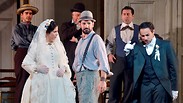
Don Giovanni
Photo: Yossi Zwecker
A stark Don Giovanni
Bravura debut performances highlight the Israel Opera’s current production of Mozart’s classic tragicomedy.
It is not unusual for foreign artists to appear with the Israel Opera; over the years, it has attracted many renowned performers, with quite a few returning for subsequent engagements. But the company’s current production of Don Giovanni, by Wolfgang Amadeus Mozart, relies on imported talent to an extraordinary and unprecedented degree.
For one, the production itself is a co-production in collaboration with no fewer than three overseas companies: The Royal Opera House Covent Garden, London; the Gran Teatre del Liceu, Barcelona; and the Houston Grand Opera. Accordingly, the Danish director, Kasper Holten, as well as the British set designer and video designer, Es Devlin and Luke Halls, respectively, are all working in Tel Aviv for the first time.
More significantly, the soloists are also overwhelmingly from abroad: on opening night, all but one of the eight leading roles were sung by non-Israelis. More astonishing still, every one of the seven were appearing in their debut performances on the Israeli stage.
The star of the show is, of course, Don Giovanni, sung on opening night by Danish baritone Palle Knudsen, who was brilliant in the role: both his acting—as the rake (in Act One), and the tormented soul (in Act Two)—and his killer good looks made him a natural for the part. Indeed, it was a particular relief that Knudsen is a handsome devil, since not all leading men in the world of opera are so blessed; and it lends a great deal to the believability of the character when one can understand how women find him irresistible.
The other leading men on this night happened to be attractive as well: Italian bass-baritone Guido Loconsolo in the role of Leporello, Polish tenor Krysztian Adam in the role of Don Ottavio, and Italian bass-baritone Daniel Giulianini in the role of Masetto. All three—as well Italian bass Mariano Buccino in the role of the Commendatore—sang their parts exceedingly well.
Of the three leading ladies, only local soprano Anat Czarny, as Zerlina, would be familiar to Israeli audiences. She is alternating in the role with sister Israeli soprano Daniela Skorka. Talented Russian sopranos Ekaterina Bakanova and Irish soprano Celine Byrne and Alla Vasilevitsky sang the roles of Donna Anna and Donna Elvira, respectively, on the night of the opening.
All six leading roles, male and female, are sung by alternating soloists through the end of the current run, whose last performance will be on February 24.
Meanwhile, this production marks the return to the podium of the conductor laureate of the Israel Opera orchestra, Daniel Oren, who is wielding the baton for the first time this season. The alternate conductor is David Nimrod Pfeffer, who is making his debut with the orchestra.
Video design is playing more of a role in an operatic productions these days, and the work of the Royal Opera’s designer leaves a lasting impression. While the overture plays, the names of Don Giovanni’s 2,065 conquests appear in projected handwriting, and a powerful 3D vortex surrounds Knudsen as he sings the famous Champagne Aria.
Otherwise, this stage production is noteworthy for its black-and-white starkness; there are very few splashes of color, and no bright colors at all, either in the scenery or the costumes. Most remarkably, in the dramatic finale, this is the only production of Don Giovanni I have seen where there is absolutely no depiction of fiery red flames of Hell; this villain is condemned instead to a realm of eternal, empty bleakness.
The next production of the Israel Opera, Giuseppe Verdi’s Don Carlo, will feature something called “The Other Side of the Curtain”—a series of lectures and backstage tours (in Hebrew) taking place before and during the opera’s upcoming run in March.
















